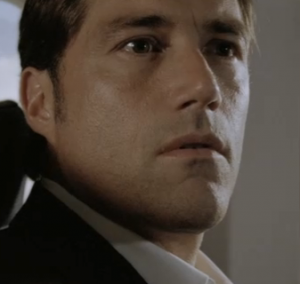
There was a moment on last night’s season premiere of Lost that was particularly amusing to me. In the new, alternate universe that the Losties’ H-bomb detonation appears to have created, Jack Shephard et al. land safely in LAX and begin to go about their lives. But as he’s waiting for his luggage to arrive, he’s paged to the Oceanic Airlines desk: We’re sorry, a flustered representative tells him, but we’ve lost your cargo, and by cargo we mean the coffin containing your father’s corpse. Whoops! And you thought United was bad?
For anyone who’s flown in the past, um, 100 years, this is a wry joke on the state of the airline industry (and probably significant in the Lost cosmology as well, but never mind). But it’s a great metaphor for what’s emerged as one of the great themes of Lost: lost fathers.
Throughout the series, we haven’t exactly seen many examples of good parenting. When fathers are present, they’re either drunks, bumblers, con artists, or corporate gangsters. At least Michael—remember him?—seemed like a good dad, learning on the fly how to forge a relationship with Will, but then along came the Others (who have their own odd relationships with children) and pretty soon Michael’s slaughtering innocent people in an attempt, so to speak, to regain custody.
Usually when your dad’s a creep, you seek out a father figure to take his place. But good luck finding a decent one on the Island! He’s likely to be a manipulator, or misguided, or the reincarnation of an Egyptian-Jewish god who lets himself be sacrificed for wholly mysterious reasons.
In fact, the closest thing we see to an admirable father is Ben Linus, who acquired his daughter by kidnapping her from a French woman, manipulating her throughout her life, and finally making a bet that monstrous guerrillas wouldn’t kill her. (Spoiler: They do.) But he at least reacts in a plausibly fatherly way, filling himself with guilt and rage and then taking revenge on the people who orchestrated her death. It’s what I imagine I would do myself, were I trapped on an island where the unimaginable occurs with frightening regularity.
But what then is the Island supposed to be, if not a refuge for these poor fatherless souls? (And I don’t mean in the literal sense—that’s for other geeks to discuss.) What the Island offers them, besides the fact that global warming means you have to worry about polar bears in tropical climates, is a fast track to independence, a life-or-death choice between dwelling on the failings of the man who created you or, through action and courage, becoming your own man (or woman). On the Island, the sins of the fathers are borne and expiated, leaving behind grown-up children who can think and act for themselves and must learn to, as Jack always says, live together or die alone.
And if you die alone, there’s no one to put your coffin on the airplane.

The whole smoke monster/Locke thing is kind of out there.